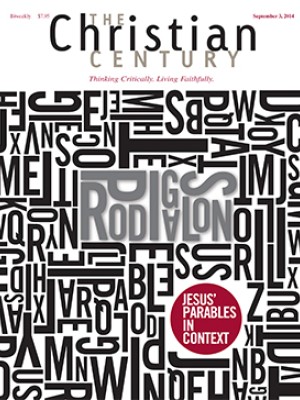Islamic State in Iraq creates reign of terror
Police cars have been repainted to say “Islamic Police.” Women are forbidden to wear bright colors and prints. The homes of Shi‘ites and others have signs stating they are property of the Islamic State. And everyone walks in fear amid a new reign of terror.
That’s what life is like in Mosul, Tikrit, and other cities in northern and western Iraq under the control of Islamic extremists after their lightning-fast military campaign overwhelmed the Iraqi army earlier this summer.
The militants, an al-Qaeda splinter group so radical that it was rejected by al-Qaeda, initially concentrated on providing services such as sanitation and restoring order. The group, which insists on being called the Islamic State, has established courts controlled by muftis, Muslim religious leaders. The group aims to impose strict Islamic rule in cities that tolerated multiple religions for centuries.
Read our latest issue or browse back issues.
Some residents are starting to rebel against the militants as they try to “cleanse” the region of anything—and anyone—deemed non-Islamic.
Many Christians in Mosul have discovered that their only choice is to flee.
“I left from my home when we received the threat,” said Abir Gerges, 45, a Christian schoolteacher who fled to Irbil, a city in Kurdistan, a semiautonomous region of Iraq protected by its own military force.
“I told my husband, ‘We have to leave,’” said Gerges, a mother of three boys. “He hesitated, saying, ‘How can I leave the house I inherited from my parents?’ But I told him they might kill us and kill our sons in front of us. What are we going to do with a house if that happens? So he decided to listen to me, and we took our money and my jewelry and a bag of clothes and left.”
Gerges and her family quickly saw the scope of the militants’ rule when they came upon a checkpoint far outside Mosul.
“I put on a veil, trying to hide, but they asked if we were Christian,” she said. “We were afraid to lie to them, so we said yes. One of them—he was masked—advanced toward me and said, ‘You must remove all the jewelry you are wearing. Now it’s Islamic State property.’ Also, they confiscated all my husband’s money. Afterward, they said, ‘Now you can go. That’s punishment for your refusal to be Muslim.’”
The new rulers are wiping out traces of churches and ancient shrines.
“The churches are closed,” said Ghaida’a Al-Rasool, a doctor in Mosul. “Yesterday, I saw an old church in the streets of the Ras al-Kur historic district. The doors of the church were walled off with cement and blocks.”
The few Christians and Shi‘ite and Shabak minorities who remain live secretly, in fear of being discovered.
“I am still in Mosul, and I know for sure I will be dead if they know I am here,” said Hassan Ali, 55, a Turkmen Shi‘ite and father of three daughters. “But what can I do? I can’t afford to move somewhere else. I prefer to die here rather than dying in refugee camps with no services and no food.”
Under the Islamic State, electricity is rationed, water pumps run dry, gas prices are spiking, and shortages of daily necessities are common.
The new hardships of daily living are particularly difficult for women and children. Though women are not barred from walking alone outside, the atmosphere has prompted many to remain indoors, keeping their children close at hand because schools have shut down.
“They want all women to be veiled and not to go outside without a man,” said Omer Othman, 37, a shopkeeper. “This is a disaster for women. They used to perform half of the family’s daily tasks.”
The Islamic State seized the small towns of Zumar and Sinjar in northern Iraq, both religiously mixed, forcing thousands of residents to flee, the United Nations said.
But the extremists may have gone too far when they started blowing up revered tombs and mosques that did not conform to their religious views, such as the burial site of biblical prophet Jonah.
“It brought out the conscience of Mosul residents,” said Al-Rasool, referring to Jonah’s tomb. “All people from all religions and ethnic groups revere this site—it is the guardian and heart of the city.”
The Islamic State “behaved very nice at the beginning of the takeover of Mosul, but they start to uncover their ugly faces. They blew up three prophets’ graves, which opened my eyes,” said Othman. “I think people won’t be standing for these injustices, and they might rise up against them very soon.” —USA Today
John Dyer contributed from New York.
This article was edited August 18, 2014.






